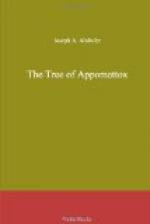“You can’t put him down, Dick, and it’s not worth while trying,” said Pennington, and Dick agreeing they went back to their own places.
The fishing now went on with uninterrupted success. Dick caught a big fellow too, and so did Pennington. Fortune, after wavering in her choice, decided to favor all three about equally, and they were content. The silvery heaps grew and they rejoiced over the splendid addition they would make to their mess. The colonels would enjoy this fine fresh food, and they were certainly enjoying the taking of it.
They ran out of chaff and fell into silence again, while they fished industriously. Dick, who was farthest up the stream, noticed a small piece of wood floating in the center of the current. It seemed to have been cut freshly. “Loggers at work farther up,” he said to himself. “May be cutting wood for the army.”
He caught another fish and a fresh chip passed very near his line. Then came a second, and a third touched the line itself. Dick’s curiosity was aroused. Loggers at such a time would not take the trouble to throw their chips into the stream. He lifted his line, caught an unusually large white chip on the hook and drew it to the land. When he picked it up and looked at it he whistled. Someone had cut upon its face with a sharp penknife these clear and distinct words:
Yankees Beware
This is our River
Don’t Fish in
It
These Fish are Ours.
Johnny
rebs.
“Well, this is surely insolence,” said Dick, and calling his comrades he showed them the chip. Both were interested, but Warner had admiration for its sender.
“It shows a due consideration for us,” he said. “He merely warns us away as trespassers before shooting at us. And perhaps he’s right. The river and the fish in it really belong to them. We’re invaders. We came down here to crush rebellion, not to take away property.”
“But I’m going to keep my fish, just the same,” said Pennington. “You can’t crush a rebellion without eating. Nor am I going to quit fishing either.”
“Here comes another big white chip,” said Dick.
Warner caught it on his hook and towed it in. It bore the inscription, freshly cut:
Let our river alone
Take in your lines
You’re in danger,
As you’ll soon
see.
It was unsigned and they stared at it in wonder.
“Do you think this is really a warning?” said Pennington, “or is it some of the fellows playing tricks on us?”
“I believe it’s a warning,” said Warner soberly. “Probably a farmer a little distance up the stream has been cutting wood, and these chips have come from his yard, but he didn’t send them. Dick, can you tell handwriting when it’s done with a knife?”
Dick looked at the chip long and critically.
“It may be imagination,” he said, “but the words cut there bear some resemblance to the handwriting of Harry Kenton. He makes a peculiar L and a peculiar A and they’re just the same way on this chip. The writing is different on the other chip, but on this one I believe strongly that it’s Harry’s.”




